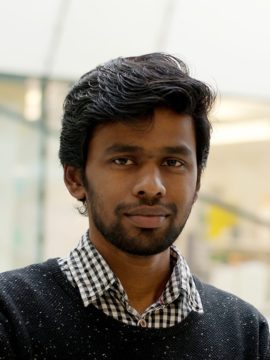RESOLFT Nanoscopy To Study Cellular Adhesions
Thesis supervisor: Brahim Lounis,
Co-supervisor : Gregory Giannone
Abstract
Cells can adjust their adhesive and cytoskeletal organizations depending on the changes in the biochemical and physical nature of their surroundings. In return, cells can also control their microenvironment by adhering and generating forces on neighboring cells and extracellular matrices. Integrin-dependent adhesion sites (AS) are the converging zones of these interactions, integrating biochemical and biomechanical signals between intracellular and extracellular components. Various cellular functions linked to AS are associated with the formation and cohesion of tissues. Cancer cells that spread through the circulatory system use mechanisms associated with cell adhesion to establish new tumors in the body.
Nanoscopic techniques have revolutionized the study of biological structures by bringing sub-diffraction imaging into the realm of light microscopy. RESOLFT (Reversible Saturable OpticaL Fluorescent Transitions) break the diffraction barrier by suppressing the volume of emission through a reversible on-off process. We studied the photophysics of a reversibly switchable fluorescent protein called rsEGFP2. The parameters obtained from these studies were used to build a RESOLFT nanoscope. Using this system, we have demonstrated an imaging resolution 4 times better than the diffraction limit (~55 nm). RESOLFT nanoscopy requires less intensity to obtain a super-resolved image, thereby reducing the effect of photobleaching and enabling long term live cell imaging.
We then used the RESOLFT nanoscope to study the initiation, stabilization, and disassembly of AS. Using this technique, we were able to study the nanoscale dynamic reorganizations of various AS proteins in vitro with healthy migrating cells and in vivo on drosophila melanogaster tissues. For in vitro migrating cells, we observed sub-diffraction sized clusters inside the AS, proving the ability of RESOLFT to study the nanoscale reorganization of proteins in AS. We observed a fast reorganization of β3-integrin-rsEGFP2 clusters inside AS, which indicates a model where a constant remodeling of AS protein clusters occurs at a timescale of few tens of seconds. It was also evident that only a low density of integrin clusters was required to maintain the AS. In addition, we observed a rearward flow of talin-rsEGFP2 clusters in AS. We measured the flow speed and found it to be close to the value obtained from other techniques like single-molecule tracking. We also studied the dynamics of zyxin nanoclusters in AS. We observed fluctuations of zyxin levels in AS, and our results indicate a link between these fluctuations and mechanical forces existing inside AS.
To enable faster imaging, we parallelized our RESOLFT setup using optical lattices. Optical lattices are periodic patterns of light formed through interference. Compared to our first implementation of RESOLFT, which probes only a single point at a time, optical lattices can be used to probe multiple points simultaneously. We also implemented a second lattice for fluorophore on switching, which helped us to reduce the effects of photobleaching during imaging. The dual lattice setup enabled long term imaging (>30 frames) of nanostructures with resolutions close to 55 nm inside living cells. The imaging was performed at a frame rate of 0.3Hz over a 15×15 μm^2 field of view.
Keywords: Adhesion Cellulaire, Nanoscopie, RESOLFT, lattice-RESOLFT, Cell Adhesion, Nanoscopy, RESOLFT, lattice-RESOLFT
Jury :
Valentin NÄGERL – Professeur (Université de Bordeaux)
Stefan JAKOBS – Professeur (Max Planck Institute – Göttingen)
Dominique BOURGEOIS – Directeur de Recherche (IBS – Grenoble)
Renaud POINCLOUX – Ingénieur de Recherche (IPBS – Toulouse)
Sophie BRASSELET – Directrice de Recherche (Institut Fresnel – Marseille)
Jean-Baptiste TREBBIA – Chargé de Recherche (IOGS – Bordeaux)
Brahim LOUNIS – Professeur (Université de Bordeaux)
Gregory GIANNONE – Directeur de Recherche (IINS – Bordeaux)


